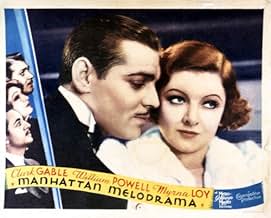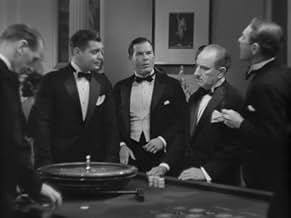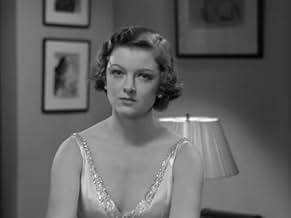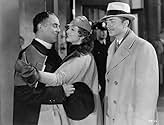IMDb-BEWERTUNG
7,1/10
5111
IHRE BEWERTUNG
Füge eine Handlung in deiner Sprache hinzuThe friendship between two orphans endures even though they grow up on opposite sides of the law and fall in love with the same woman.The friendship between two orphans endures even though they grow up on opposite sides of the law and fall in love with the same woman.The friendship between two orphans endures even though they grow up on opposite sides of the law and fall in love with the same woman.
- 1 Oscar gewonnen
- 4 wins total
Thomas E. Jackson
- Richard Snow
- (as Thomas Jackson)
Isabelle Keith
- Miss Adams
- (as Claudelle Kaye)
Oscar Apfel
- Speaker of Assembly
- (Nicht genannt)
William Arnold
- Blackjack Dealer
- (Nicht genannt)
William Augustin
- Detective
- (Nicht genannt)
Empfohlene Bewertungen
... those being "San Francisco" given the impact a disaster has on a community and the friendship as well as adversarial relationship the two male leads have to one another - with Gable being named "Blackie" in that one too, and the other being "The Thin Man" which reunites William Powell, Myrna Loy, and Nat Pendelton in a much better production that fires on all cylinders. Of course, both of these were directed by the director of this film, W. S. Van Dyke. That being said, this film doesn't seem nearly as good as it could have been.
The plot is this - Two friends grow up in the shadow of tragedy caused by sudden loss. The younger one is Blackie Gallagher (Clark Gable) and is always trying to work an angle - usually involving gambling - even before the tragedies. The older one is Jim Wade (William Powell) always studying, always chiding Blackie for his slacker and crooked ways, but always his friend. In adulthood, Blackie is a big time gambler and casino owner and is not adverse to murdering associates and Jim becomes district attorney in New York. And yet whenever they meet they seem fast friends. Eleanor (Myrna Loy) starts out Blackie's girl but decides she wants the conventional marriage she'll never get from Blackie and eventually marries Jim.. At this point I was starting to get bored with this morality tale until some of Blackie' s criminal acts cross paths with Jim's official duties where complications ensue.
There is just something off about this film. For one, Jim is supposed to be an uncorruptible political star destined for higher office but within the details of the film instead seems hopelessly naive and inflexible. Myrna Loy makes the transition from gangster moll to pious first lady in the blink of an eye, and even when she is with Blackie she is nagging him to "quit the rackets". Where did she think those marvelous evening gowns came from? There's just no way I'm believing Blackie is as ruthless in the rest of the film as he is shown to be and is just so "Oh gee whiz what class Jim has!" in response to things that impact his male pride (Eleanor), his livelihood, and even life itself. I guess none of this is as ridiculous as being expected to believe that Mickey Rooney grows up to be Clark Gable, but still the inconsistent characterizations are bothersome.
I'd say it is probably worthwhile overall and just to give it a pass as some of the weirdness may have been caused by confusion over just what exactly the production code, which began to be enforced two months after this was released, would allow.
The plot is this - Two friends grow up in the shadow of tragedy caused by sudden loss. The younger one is Blackie Gallagher (Clark Gable) and is always trying to work an angle - usually involving gambling - even before the tragedies. The older one is Jim Wade (William Powell) always studying, always chiding Blackie for his slacker and crooked ways, but always his friend. In adulthood, Blackie is a big time gambler and casino owner and is not adverse to murdering associates and Jim becomes district attorney in New York. And yet whenever they meet they seem fast friends. Eleanor (Myrna Loy) starts out Blackie's girl but decides she wants the conventional marriage she'll never get from Blackie and eventually marries Jim.. At this point I was starting to get bored with this morality tale until some of Blackie' s criminal acts cross paths with Jim's official duties where complications ensue.
There is just something off about this film. For one, Jim is supposed to be an uncorruptible political star destined for higher office but within the details of the film instead seems hopelessly naive and inflexible. Myrna Loy makes the transition from gangster moll to pious first lady in the blink of an eye, and even when she is with Blackie she is nagging him to "quit the rackets". Where did she think those marvelous evening gowns came from? There's just no way I'm believing Blackie is as ruthless in the rest of the film as he is shown to be and is just so "Oh gee whiz what class Jim has!" in response to things that impact his male pride (Eleanor), his livelihood, and even life itself. I guess none of this is as ridiculous as being expected to believe that Mickey Rooney grows up to be Clark Gable, but still the inconsistent characterizations are bothersome.
I'd say it is probably worthwhile overall and just to give it a pass as some of the weirdness may have been caused by confusion over just what exactly the production code, which began to be enforced two months after this was released, would allow.
'Manhattan Melodrama' may not have the stylistic finish to it to make it a great message movie about contemporary 30s issues, but it does go a long way towards that end, and is never less than engaging.
Clark Gable is the happy-go-lucky gangster Blackie who is being tried for murder by his boyhood best friend Jim, William Powell, a D.A. who has made it to governor of New York because of a murder done by Blackie, unbeknownst to Jim. On top of it all they both love the same woman, Myrna Loy.
Despite its melodramatic but never overwrought style 'Manhattan Melodrama' has sufficient weight and substance to make itself heard 70 years after the fact. It cuts no convenient corners in the description of the governor's sad plight of having to decide whether his friend should live or die, and it paints a wonderful and believable picture of Loy's character who does what she deems best. Powell delivers a multi-layered performance that has to count amongst his best, and Gable is irrepressible and delightfully amoral as the bad guy we're all rooting for.
Recommended, but please don't judge it by the first 20 minutes which are rather slow-moving, but still entertaining.
Clark Gable is the happy-go-lucky gangster Blackie who is being tried for murder by his boyhood best friend Jim, William Powell, a D.A. who has made it to governor of New York because of a murder done by Blackie, unbeknownst to Jim. On top of it all they both love the same woman, Myrna Loy.
Despite its melodramatic but never overwrought style 'Manhattan Melodrama' has sufficient weight and substance to make itself heard 70 years after the fact. It cuts no convenient corners in the description of the governor's sad plight of having to decide whether his friend should live or die, and it paints a wonderful and believable picture of Loy's character who does what she deems best. Powell delivers a multi-layered performance that has to count amongst his best, and Gable is irrepressible and delightfully amoral as the bad guy we're all rooting for.
Recommended, but please don't judge it by the first 20 minutes which are rather slow-moving, but still entertaining.
With a cast like this, how can you go wrong? And the film is a delight from beginning to end. Although all the players were great, special kudos to William Powell, whose uncompromising morals cause him to lose almost everything he has. His is a gut-wrenching performance, and the scene in which he addresses the assembly with tears in his eyes to tell of his own "weakness"--wow. It's rare to see Powell in a role with so much complexity and it is a marvelous performance.
Two boyhood friends (one played by a very young Mickey Rooney) grow up on opposite sides of the law. Clark Gable becomes a criminal--William Powell becomes governor. Myrna Loy loves both.
This plot is now screamingly familar but, back in 1934, this was original. In fact it won the Best Original Story Oscar for its year. This could have been a real howler but a great cast, tight script and wonderful direction really put it over. Well worth catching--especially for a powerful climatic scene between Powell and Gable. A classic of its type.
This plot is now screamingly familar but, back in 1934, this was original. In fact it won the Best Original Story Oscar for its year. This could have been a real howler but a great cast, tight script and wonderful direction really put it over. Well worth catching--especially for a powerful climatic scene between Powell and Gable. A classic of its type.
They didn't name this "Manhatten *Melodrama* for nothing - it's classic melodrama! If you can get past the first fifteen minutes or so, what saves this film is the three leads: William Powell, Clark Gable, and Myrna Loy. As a Myrna Loy/William Powell fan, I love the whole scene from their first meeting, as she flings herself into his taxi, and he thinks she is out to wreck his career by pretending he assaulted her! Clark Gable is great as the charming bad guy, too. Of course, in this story about unpunished crime vs. betraying a friend, nobody ever considers the third way, but then it wouldn't be a melodrama anymore, would it? Anyway, if you enjoy golden oldies or any of the three main actors, it's worth watching.
Wusstest du schon
- WissenswertesThe opening scenes depict the General Slocum disaster on the morning of June 15, 1904. The popular excursion steamer caught fire in New York's East River while transporting passengers to a picnic organized by St. Mark's Evangelical German Lutheran Church on the Lower East Side of Manhattan. With an estimated 1,021 fatalities, mostly women and children, this was New York City's single worst tragedy, in terms of lives lost, before 9/11. An incompetent, inexperienced crew was held primarily to blame for the tragedy.
- PatzerIn the cheering New York City crowds on Jim Wade's election night, supposedly in November 1925, theatre marquees are promoting 1933 films, including MGM's Dinner um acht (1933) and Sexbombe (1933) with Michael Strogoff (1910).
- Zitate
Edward J. 'Blackie' Gallagher: Die the way you lived, all of a sudden, that's the way to go. Don't drag it out.
- Alternative VersionenAlso available in a computer colorized version.
- VerbindungenFeatured in David O. Selznick: 'Your New Producer' (1935)
Top-Auswahl
Melde dich zum Bewerten an und greife auf die Watchlist für personalisierte Empfehlungen zu.
- How long is Manhattan Melodrama?Powered by Alexa
Details
- Erscheinungsdatum
- Herkunftsland
- Sprache
- Auch bekannt als
- Three Men
- Drehorte
- Produktionsfirmen
- Weitere beteiligte Unternehmen bei IMDbPro anzeigen
Box Office
- Budget
- 355.000 $ (geschätzt)
- Laufzeit
- 1 Std. 33 Min.(93 min)
- Farbe
- Seitenverhältnis
- 1.37 : 1
Zu dieser Seite beitragen
Bearbeitung vorschlagen oder fehlenden Inhalt hinzufügen






































